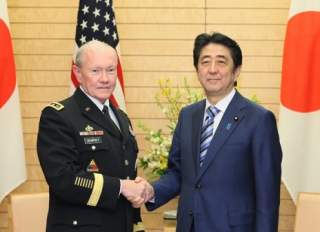Could Okinawa Derail U.S.-Japan Relations?
"Averting an alliance crisis over Okinawa was Reischauer and Kennedy’s challenge. Averting another one is ours."
In fact, just a few days after the symposium, Okinawa’s governor, Takeshi Onaga, brought the issue back into the headlines. Japan’s Defense Ministry had begun preliminary exploration and drilling on a facility that would replace the U.S. Marine base at Futenma. Tokyo and Washington view the move as essential to create a sustainable U.S. presence, because it moves the Marines out of a potentially dangerous urban location.
But Okinawans didn’t want the facility moved to a different part of Okinawa—they wanted it off the island completely, and elected Governor Onaga on that platform. On March 22 he issued a deadline of one week to stop the drilling, or lose the permit. Tokyo ignored him, describing his demand as “very regrettable,” and suspending the governor’s work stoppage order.
Onaga responded by vowing, “I will knuckle down and respond to this in keeping with the will of the Okinawans.”
What happens next? “Once again,” wrote DC scribe Chris Nelson, “the base relocation issue threatens to blow up in our face.” The Okinawans are, in Carol Fulp’s words, becoming visible. They’re shouting louder and louder—and want to be onstage too. Averting an alliance crisis over Okinawa was Reischauer and Kennedy’s challenge. Averting another one is ours.
Jennifer Lind is an associate professor of government at Dartmouth, and the author of Sorry States: Apologies in International Politics. She is on Twitter @profLind
Image: Office of the Prime Minister of Japan

